Access Resource Kit (ARK) - Disability Services Commission
Access Resource Kit (ARK) - Disability Services Commission
Access Resource Kit (ARK) - Disability Services Commission
Create successful ePaper yourself
Turn your PDF publications into a flip-book with our unique Google optimized e-Paper software.
PEOPLE WITH DISABILITIES<br />
Disabilities vary according to individual circumstances, however the following generally<br />
applies.<br />
People who are blind or have vision impairments<br />
People with significant vision loss can be totally blind or have low vision. Some causes of<br />
vision loss are:<br />
• glaucoma;<br />
• diabetes;<br />
• cataract; or<br />
• trauma to the eye through an accident, injury or disease.<br />
People who are deaf or have hearing impairments<br />
People who have a hearing impairment or are deaf can have a hearing loss ranging from<br />
the very mild through to profound. The majority of people have mild hearing impairments<br />
and communicate verbally. People who are profoundly deaf may communicate in Auslan<br />
(Australian Sign Language).<br />
Cerebral Palsy<br />
Cerebral palsy is a term used to describe a number of conditions that cause abnormalities<br />
of movement and posture. The degree of disability can range from minimal to severe.<br />
People with cerebral palsy may also have difficulty in communicating and with mobility.<br />
Multiple Sclerosis<br />
Multiple sclerosis (MS) affects the central nervous system and interferes with the<br />
transmission of nerve impulses throughout the brain and nervous system.<br />
Symptoms can include sensory changes, muscle weakness, fatigue, pins and needles,<br />
numbness or blurred vision. MS can also affect mobility and muscle coordination, bladder<br />
control, speech, balance, concentration and memory.<br />
Intellectual <strong>Disability</strong><br />
For many people who have an intellectual disability the cause is unknown. For others<br />
there may be well described syndromes. The majority of people with an intellectual<br />
disability now live in the wider community, supported by a range of services to meet their<br />
needs.<br />
Intellectual disabilities can occur in various degrees of severity and each person’s abilities<br />
will differ accordingly.<br />
People with Disabilities and Planning for <strong>Access</strong> (Aust Standards updated February 2011)1.4


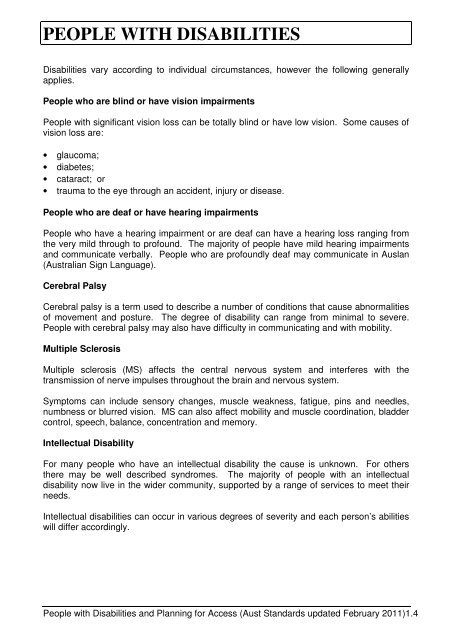
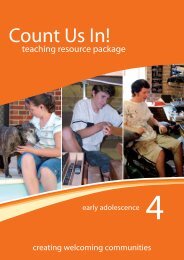
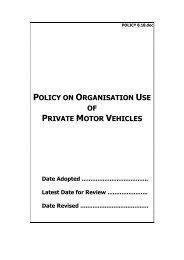
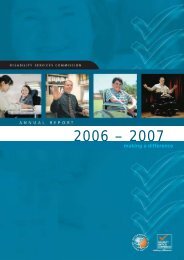

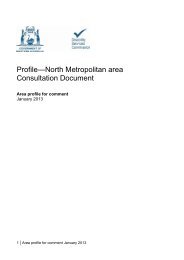
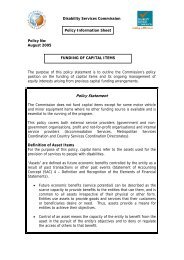
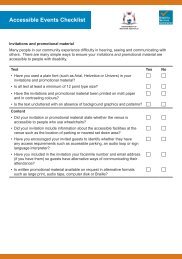
![Heerarka Adeegyada Naafada [PDF 102 kB] - Disability Services ...](https://img.yumpu.com/22096139/1/184x260/heerarka-adeegyada-naafada-pdf-102-kb-disability-services-.jpg?quality=85)
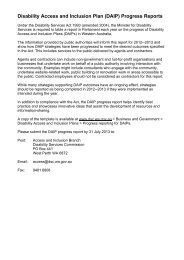

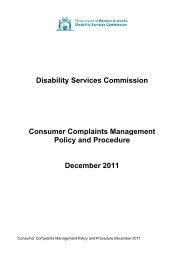
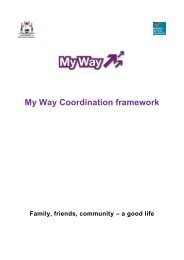
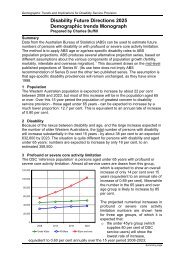

![معايير خدمات الإعاقة [PDF 297 kB] - Disability Services Commission](https://img.yumpu.com/22096120/1/184x260/-pdf-297-kb-disability-services-commission.jpg?quality=85)